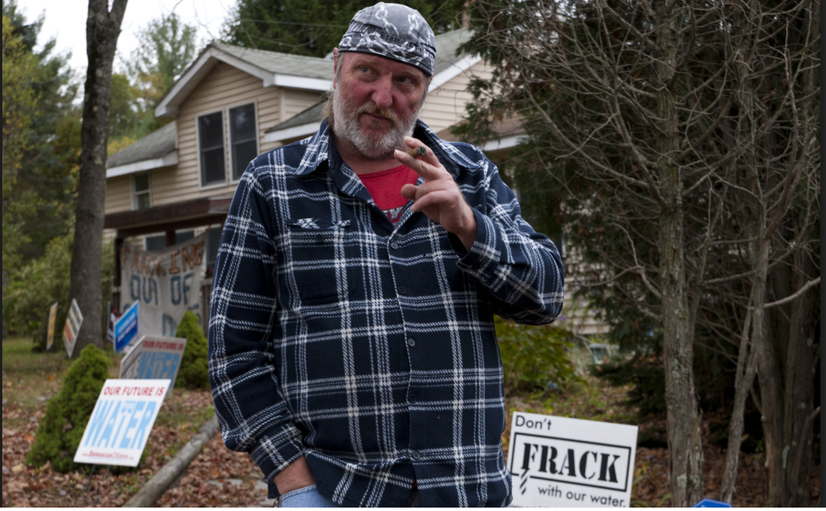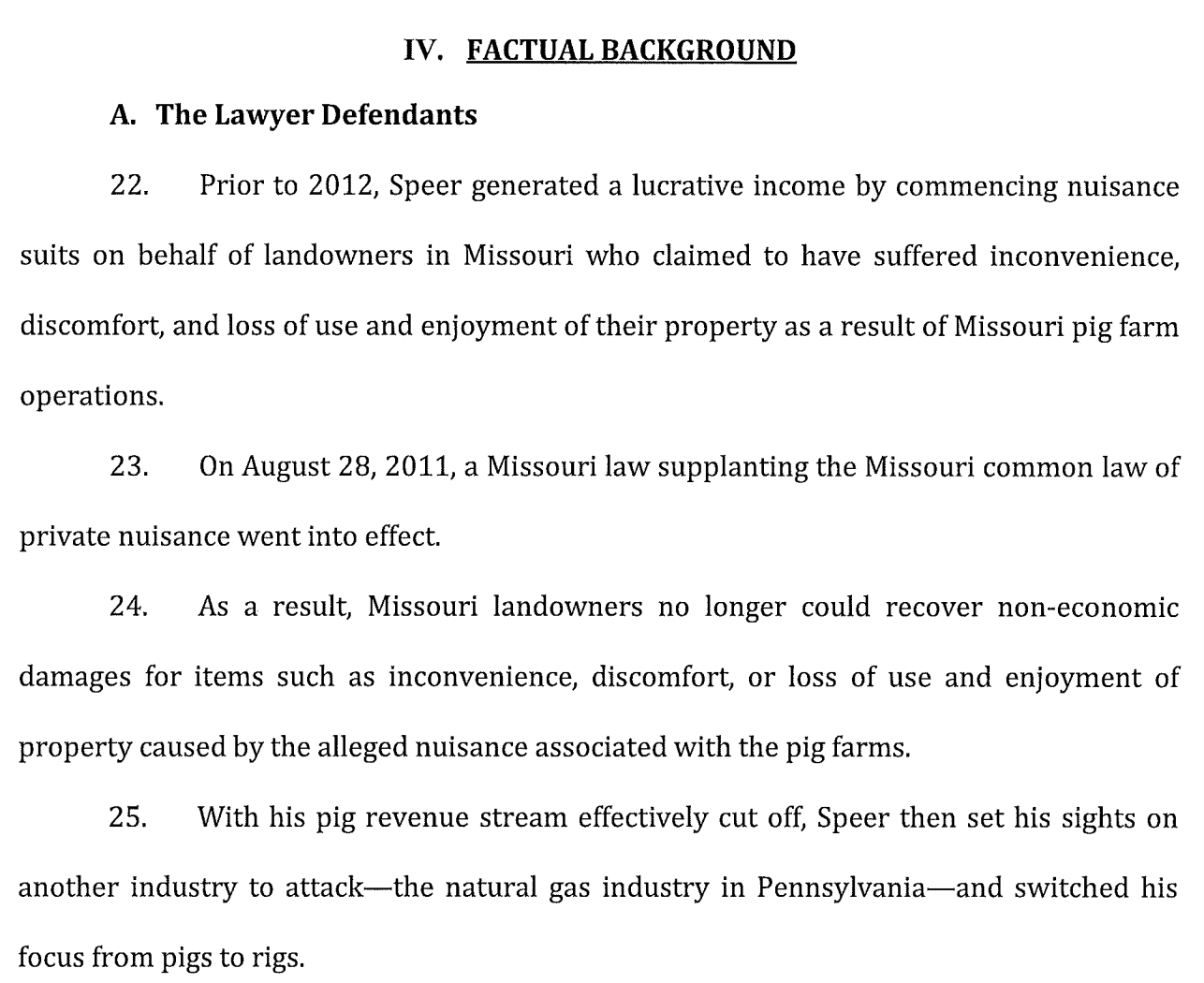Cabot Oil and Gas Corporation has filed a $5 million civil lawsuit in county court against Dimock, Pennsylvania, resident Ray Kemble, who claims Cabot severely contaminated his water after drilling and hydraulic fracturing (“fracking”) activity.
The company, scrutinized in the film Gasland and subject of an ongoing federal class action lawsuit since 2009, has also sued a handful of lawyers representing Kemble. Cabot’s lawsuit claims that Kemble harmed the fracking giant by attempting to “attract media attention” over pollution to his water, which the company claims breached an earlier 2012 settlement agreement as part of the ongoing federal class action lawsuit.
Charlie Speer, one of Kemble’s lawyers who was named in Cabot’s August 7 lawsuit, said in a statement to DeSmog that Pennsylvania law doesn’t actually allow plaintiffs to name a dollar amount for the types of harm Cabot is claiming. He argued that the dollar total the company demanded was meant to “grab headlines.” Kemble filed a follow-up lawsuit earlier this year based on new findings pertaining to water contamination, which Cabot argues in its complaint “included irrelevant and inflammatory allegations” and was meant to “poison the jury pool” and “extort payment” from the company.
Kemble eventually dropped the 2017 lawsuit, Speer explained, because the legal team had learned “new information [which] would negatively affect Mr. Kemble’s case.” Speer denied a request for comment on what that new information was.
In his now-dismissed lawsuit, Kemble said that Cabot’s fracking, beginning in November 2012, turned his groundwater “black, like mud, [with] a strong chemical odor.”
But Cabot alleges that the filing of that lawsuit was a breach of the 2012 settlement contract Kemble had agreed to and a wrongful use of civil court proceedings, writing that Kemble’s lawyers had “failed to exercise even that care which a careless person would use.”
‘Pigs to Rigs’
Cabot’s complaint also describes Kemble’s lawyer Speer as a “pig farm nuisance lawyer.” Speer’s law firm made a name for itself by using novel legal strategies to hold major corporations liable for the nuisance that Concentrated Animal Feed Operations (CAFOs), with their pools of millions of gallons of livestock manure, had caused to people living nearby.
Cabot further notes in its complaint that after Missouri passed legislation in 2011 to crack down on CAFO lawsuits, Speer’s Missouri-based firm switched its focus from “pigs to rigs” in Pennsylvania, in reference to oil and gas production rigs.
Credit: Pennsylvania Court of Common Pleas, Susquehanna County
The “pigs to rigs” line was also echoed by Natural Gas Now, a blog run by Tom Shepstone, who formerly worked at the industry-funded front group Energy in Depth.
“An overdue lawsuit by Cabot Oil & Gas has been filed against a gang of ‘pigs to rigs’ trial lawyers and their Dimock junkyard plaintiff Ray Kemble,” wrote Shepstone. “Cabot Oil & Gas has fired a shot against the seedy trial lawyers and even seedier hustlers trying to earn fame and money with jugs of brown water and filthy accusations surrounding Dimock. Cabot has filed a lawsuit against pig farm suer Charlie Speer, his Luzerne County trial lawyer associates and Ray Kemble.”
Energy in Depth previously criticized Speer and his firm by name in a 2013 blog post. Bloomberg reported that same year that Speer’s firm planned to use the nuisance legal strategy in the fracking arena.
“I call them quality-of-life lawsuits,” Speer told Bloomberg at the time. “I consider these to be private property rights cases, and everybody in this country understands private property rights and values them.”
Feds Come to Dimock
The filing of Cabot’s lawsuit came just days after the U.S. Agency for Toxic Substances and Disease Registry (ATSDR) visited Dimock to examine the groundwater of those who lived in close proximity to Cabot’s fracking wells, including Kemble’s.
“Take a skunk and every household chemical, put it in a blender, puree it for five minutes and take a whiff,” Kemble told the Associated Press, as he described the smell of his well water in explanation of the federal agency’s visit. “It burns the back of your throat, makes you gag, makes you want to puke. It’s all still bad. That’s why they’re back up here.”
ATSDR told AP that it was in Dimock to test water for bacteria, gases, and chemicals, while also doing indoor air monitoring for radon. Its previous study found chemicals — including methane, arsenic, cadmium, and lead — in the drinking water of Dimock’s citizens and further noted that a “risk of explosion or fire exists for five residences” due to the high methane levels.
“Residents have continued to raise concerns about natural gas activities impacting their private water well quality,” ATSDR told AP, adding that the rationale for its first return to Dimock since 2012 was to “determine if there are drinking water quality issues that may continue to pose a health threat.”
Kemble is not giving comments to press. Craig Stevens, another Pennsylvania landowner with contaminated water, believes the lawsuit is in retaliation for ATSDR’s return to Dimock. Stevens testified along with Kemble during the U.S. Environmental Protection Agency’s (EPA) national study on fracking’s potential water impacts during the Obama administration
“It looks like they got upset because Ray and I got the ATSDR to come back in there,” Stevens told DeSmog. “That’s the first time a federal agency has reopened a case like this. I’m imagining Cabot is none too happy with their friends being tested, because, get this, it’s (Freedom of Information Law) FOIL-able. It might be redacted, but it doesn’t matter, from what I understand, they picked the worst water out of the original tests that EPA found five years ago. There were 27 wells of concern that EPA had tested in the area, that EPA found were problematic.”
Broader SLAPP Trend
Another company, Range Resources, used this counter-suing tactic in Texas in what was seen by critics as a SLAPP (strategic lawsuit against public participation) lawsuit, which is meant to threaten and make an example of a citizen or group of citizens.
That $3 million Texas lawsuit involved Steve Lipsky, whose groundwater was also under EPA investigation for potential water contamination from oil and gas drilling — until, in a politically charged atmosphere, the Obama administration dropped the study. Lipsky, who argued the lawsuit was a violation of Texas’ Citizens Participation Act, eventually saw his case reach the state’s Supreme Court and lost. Range Resources’ defamation case against him is ongoing.
Stevens pointed out that both he and Kemble have been a vocal critic of fracking well beyond the borders of Pennsylvania.
“Ray went to Maryland with me, where they banned fracking, went to Florida, to Virginia, to Washington, D.C. twice,” Stevens told DeSmog, noting that the two of them had taken seven trips together to speak about fracking and advocate against the drilling technique nationwide. “Since those trips, Maryland has banned it and Florida has two bills to ban fracking. We just go and educate people about what they’ve done in Pennsylvania.”
Speer seemed to agree that the lawsuit appears to fall in the SLAPP category.
“I read the lawsuit and it seems like a clear attempt by Cabot and the entire gas industry to intimidate us, our clients, and the public from protecting their rights,” said Speer. “We will continue to protect the rights of those that have been harmed by the gas industry not only in Susquehanna County but throughout Pennsylvania.”
Cabot, meanwhile, looks to have launched a new counter-offensive in the years-long legal battle in Dimock.
“Cabot will protect its rights and pursue justice against those who irresponsibly and maliciously abuse the legal system,” George Stark, the company’s director of external affairs, said in a press statement.
Main image: Ray Kemble Credit: © Laura Evangelisto, DeSmog
Subscribe to our newsletter
Stay up to date with DeSmog news and alerts







